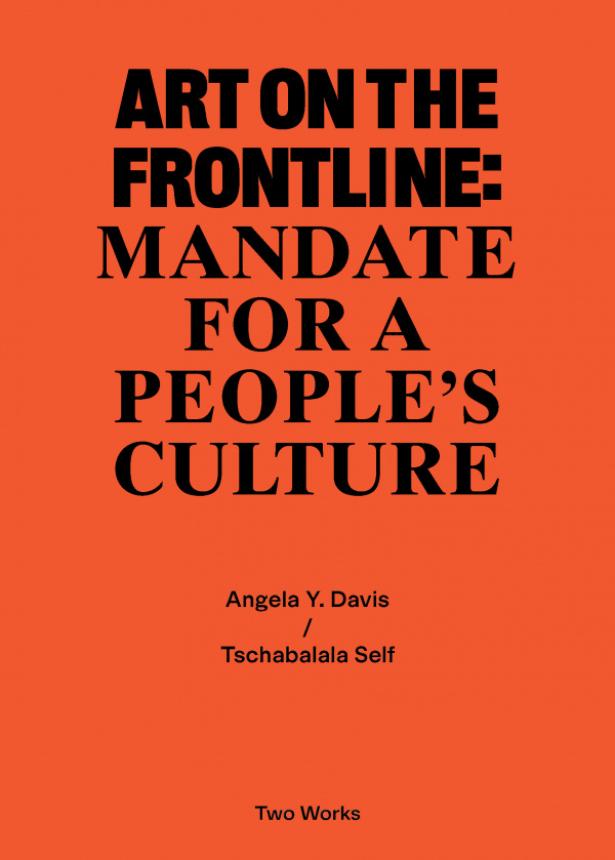Angela Y. Davis and Tschabalala Self, Art on the Frontline: Mandate for a People's Culture
Walther König, Köln/Afterall Books
ISBN-13: 978-3960989011
A radical communion of painting and writing, Art on the Frontline: Mandate for a People’s Culture reckons with the leftist political potential of Black visual and expressive culture. The book stages an open-ended dialogue between a 1985 essay penned by the scholar-activist Angela Davis and a series of recent paintings by the artist Tschabalala Self. Davis published “Art on the Frontline” for a Marxist audience 35 years ago. In this reprint, her concise indictment of bourgeois aesthetics is followed by Self’s paintings, which respond to the essay.
Davis’s essay was originally published as “For a People’s Culture” in a 1985 issue of Political Affairs, a monthly Marxist magazine run by the Communist Party USA. A poignant question undergirds the essay: “How do we collectively acknowledge our popular cultural legacy and communicate it to the masses of our people, most of whom have been denied access to the social spaces reserved for art and culture?” In processing this inquiry, Davis narrates a litany of moments in which art has pushed for radical social transformation, from the fugitive songs composed by enslaved Africans to Stevie Wonder’s Motown “Happy Birthday,” which strengthened the movement to make Dr. Martin Luther King Jr.’s birthday a national holiday. Most of her named examples, like hip hop, the blues, and the “freedom songs” of the Civil Rights Movement, are musical, but she references visual mediums as well. She credits the WPA artists for the unparalleled success of bringing art to the people through public murals, theater, and sculpture. Other collaborations across music, visual art, and literature, like “Art Against Apartheid” programming in 1984 and 1985, mobilized solidarity for Nelson Mandela’s release from prison and liberation for all Black South Africans. In the San Francisco Bay Area and beyond, Davis recognizes the incredible reach of initiatives such as the national movement of “Artists’ Call Against Intervention in Central America.”
The book’s second half consists of over 30 paintings made by Tschabalala Self more than 30 years after Davis’s essay was published for a Marxist audience. This time, the audience has shifted to Afterall, a journal and publishing house focused on contemporary art and cultural criticism. Afterall’s “Two Works” book series, for which visual artists respond to iconic essays, encourages an engagement between art and text. Self’s paintings are untitled and undated in the book itself, allowing for images to be the only artistic language in her section. The series of portraits, sketched and painted with acrylic and colored pencils, can come across at first glance as a bit wacky. Their chaotic and colorful swirls and brushstrokes make the still subjects appear dynamic, as if paused mid-expression. Highlighter-blond hair, massive bowling-ball-shaped breasts, turquoise eyebrows, polka-dotted tongues, and enormous teeth are among the exaggerated features.
Each figure relays a different blend of emotions: confusion, pleasure, joy, indifference. These illustrations reflect an astute claim in Davis’s essay: while she focuses on overtly sociopolitical meanings in art, she acknowledges that “… not all progressive art need be concerned with explicitly political problems,” because “a love song can be progressive if it incorporates a sensitivity toward the lives of working-class women and men….” Put another way, art is not required to be didactic or dedicated to social realism to deliver a radical political message or strengthen an oppositional consciousness among marginalized people. That which makes Black women, for example, feel celebrated in our complexity, plays an important role in leftist visual and expressive culture.
Drawing on this point, Self’s work represents everyday working people, Black women in particular, through a mode that is both playful and erotic while also profound and authentic — diving into celebrations of forms of embodiment and representation often denigrated by classist respectability politics. The figures, with their tongues out, conjure joyous associations with rappers like Cardi B and Megan Thee Stallion who, when sticking their tongues out for photographs and videos, exude carefree playfulness and free sexuality often divorced from representations of Black women. That Self’s figures are nearly always curvaceous and collaged taps into a distinct Black feminist politic centered on abundance: that is, fleshy bodies and infinite selves.
Such a juxtaposition — Self’s exuberant paintings and Davis’s fiercely anti-capitalist writing — is as pertinent in 2023 as it was in 2020, when Self painted these works within the context of racial uprisings after the murder of George Floyd. I am writing this in the wake of the murder of unhoused performance artist Jordan Neely on the subway in New York City. Those of us who detest the circulation of anti-Black violence have opted to share videos of Neely’s spectacular Michael Jackson impersonations to honor him as opposed to the footage of his brutal killing. That Neely once entertained working New Yorkers on their commutes home reminds me a great deal of Davis’s “people’s culture” that is accessible to the masses as opposed to confined within elitist institutions. Reading Art on the Frontline: Mandate for a People’s Culture is deeply apropos to our moment, in which contemporary art is entangled with racial capitalism, but frontlines artists themselves are resisting.
Alexandra M. Thomas is a PhD student in History of Art, African American Studies, and Women’s, Gender and Sexuality Studies at Yale University. Her research interests include: global modern and contemporary art, film, and performance; African and African diasporic arts and expressive cultures; and feminist and queer theory.


Spread the word